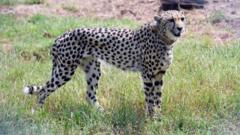Authorities in Kuno National Park, India, have announced disciplinary measures against a forest worker who was filmed providing water to a cheetah and her cubs, a video that has since gained significant traction online. The man, employed as a driver at the sanctuary, breached established protocols prohibiting such interactions with the wildlife, as only authorized personnel are permitted near the big cats.
The cheetah species was declared extinct in India in 1952, marking the only large mammal extinction since the country gained independence. They were successfully reintroduced to the Kuno park in 2022 as part of an initiative to restore the population.
The controversy arose when the video surfaced on a Sunday, showcasing the driver pouring water into a metal pan after being coaxed by unseen individuals. Moments later, a cheetah named Jwala and her four cubs approached to drink. Park officials noted that it is common practice for trained staff to lure animals back to the forest if they venture too close to the park's boundary.
Despite initial reporting deeming the video "heartwarming," social media reactions quickly pivoted, highlighting the potential dangers posed by such interactions. Some users advocated for the establishment of permanent water sources within the park to prevent the cats from straying into populated agricultural areas during the hot summer months.
As tensions rise in surrounding villages, where cheetahs have been attacking livestock, there have been instances of villagers retaliating against the cats. Alongside these developments, officials are actively working to foster a better understanding among local communities about coexisting with these predators.
Since the relocation of twenty cheetahs from South Africa and Namibia to Kuno between 2022 and 2023—marking a landmark transcontinental initiative—eight have already died from various causes, compelling questions about the suitability of the park environment for these animals. Experts associated with the reintroduction expressed concerns about the oversight and veterinary support provided to the relocated cheetahs.
In response, park authorities refuted allegations pertaining to deficiencies in medical care, asserting that there are currently 26 living cheetahs in Kuno, comprising 17 in the wild and nine in enclosures. Looking ahead, India is on track to welcome an additional 20 cheetahs from South Africa this year.






















